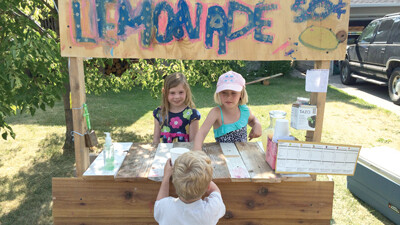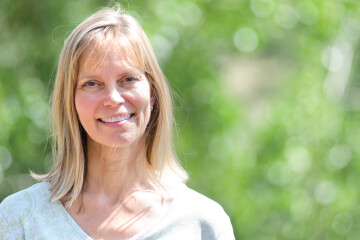Stopping At Every Lemonade Stand:
How to Create a Culture That Cares for Kids By James Vollbracht

This summer our neighbors spent time with our children and their children building a very nice lemonade stand. I mentioned the lemonade stand at an appointment; how well the girls were doing, and how much fun they were having. The receptionist immediately responded by letting me know she had read a book by a local Bozeman author, and that she stops at every lemonade stand she sees because of it. By the end of my appointment she had printed out the info about the book and suggested I check it out at the Bozeman Public Library. The book was Stopping At Every Lemonade Stand: How to Create a Culture That Cares for Kids by James Vollbracht. I did check it out at the BPL and enjoyed it very much, it inspired me to look Jim up online, find his website and give his local cell phone number a call. From there we created this dialogue:
AR: What was the inspiration behind writing Stopping At Every Lemonade Stand?
JV: As I have traveled across the country and spoken at venues ranging from Governor’s Conferences to community events I’d share inspiring stories about how people were making a difference for kids in their own backyards. From the mom in Sundance, Wyoming, to the grandma in inner city Baltimore, to the teacher who worked with homeless kids in Seattle. And when I’d get done I’d always have several people waiting to tell me their stories. They were so moving and inspiring I knew they had to be in a book. So I started collecting stories from all across North America, but I also knew that everyone has their own circle of influence, and the book explains how through six different circles, regardless of one’s position they can make a difference. So I included in the book stories ranging from individuals, to families, communities, businesses, government, and elders. And there is also a huge amount of data that supports the “obvious” - that doing small things can create a big difference.
AR: Give our readers an explanation of what they are going to get out of your book.
JV: What most people don’t realize is that we are the most disconnected culture in history when it comes to raising our kids. In 1950, 50% of all American homes had grandparents in or near the home. Today that’s less than 10%! What does this mean? We’ve lost the most important support system that has raised kids throughout history which is extended family! If you were growing up and didn’t get along with your parents, maybe you had a grandparent, cousin, aunt, or uncle that would take you under their wing or teach you a skill. Kids used to grow up learning to help out at the family business, and if they didn’t do their chores on the farm – the family didn’t eat! I don’t try to glorify past times because there were a lot of abuses, but kids had to grow up a lot faster in terms of acquiring skills because they were essential to the family and community existence. What most don’t realize is that we have also become the most professionalized culture in history. Rather than wisdom being passed down from parents and elders to kids, most everything has become professionalized or kids are being taught by television or the media. I think we expect way too much from schools, and our kids need to be learning from neighbors, work, and real life. That’s why the book is all about personalizing our interactions with kids wherever we are, seeing ourselves as mentors, and not expecting programs and professionals to raise our kids. On the upside there’s a remarkable revolution taking place. With technology we have kids now teaching adults – information and knowledge is now flowing upward. We have a great opportunity to take advantage of this shift and utilize the innate talents of our kids.
AR: If our readers could only take one thing out of the entire book what would you want that to be?
JV: In the 1700’s there was a consolidated tribe of Native Americans in northern New York known as the Iroquois Confederacy. They had one of the first forms of democracy in America. It was so well known that Benjamin Franklin traveled to meet with them and find out how they operated.
They had a very unique system. First, every mother had two votes on every issue – one for themselves and one for their child. Second, they tried to ask with every decision - “how will this affect the next 7 generations?” They were really into sustainability as they knew they couldn’t survive without long term planning, and they consciously made efforts to create a culture that honored the future of their children. So, I would hope that this book helps us realize our kids are our most important resource, that they need to be considered and involved in as many aspects of community life as possible, whether it’s an advisory board to the city council, or a conscious effort to have them give back to the community through service, or by creating an entrepreneurship initiative where kids present ideas and are given mini-grants to pursue their dreams.
Can you imagine a youth “Shark Tank” sponsored by banks or local businesses where grants are given to well thought out business or community improvement projects initiated by kids? Kids would develop real life skills and be actively involved in the community. We want our kids to get high on life and their dreams – not drugs.
AR: Do you have a favorite quote that you wrote in the book that you really feel like are impactful and powerful?
JV: One of the most moving stories I heard was from a crisis counselor in Seattle who worked with homeless kids. She told me that many of these kids were homeless not because they wanted to be but because they had been abused or abandoned. There was one boy she really liked, and one day when she came to work she was stunned when she found out he had committed suicide. She was in tears and said to me “if only he had someone in his life who adored him it would have made all the difference. Every kid needs to be adored.” That has stuck with me forever.
AR: If there is just one book that you could recommend to our readers based on the way it impacted your life what would that be?
JV: This may sound corny, but I hope it doesn’t. Any book with stories about how Mother Teresa served the poor and unwanted brings tears to my eyes. She dedicated her life to help the unlovable, and it is through her simple acts of kindness from smiling to assisting someone on the streets die with dignity just does me in. And in some ways that’s really the theme of my book – how through simple acts of kindness and working in our own circle of influence we can create a culture that truly cares for kids.
AR: What is your favorite way to give back locally?
JV: My favorite way to give back locally is through daily interactions that may seem inconsequential but can pay off big. For instance, whenever I’m asked if I want my groceries carried out to the car, I always say yes – especially if it’s a young person. It’s because in our slow walk out to the car I can ask them all kinds of questions. I’ve learned about kids who love Bozeman High because of the music program, and been invited to hear them play. I’ve talked to kids who just moved to Bozeman and they’re trying to find their way. They all love to talk. The beauty of this is that when I see them again I can pick up the conversation, and I’ve found out where they want to go to college, what their dreams are, and they’re all so willing to share. I hope it helps in some small way help them feel important and I benefit too as I can connect with this incredible reservoir of energy. These opportunities are everywhere because kids and young people are everywhere!!
And what I’ve discovered since moving back to Bozeman is that Bozeman is so unique. It still feels very safe and is the perfect size to initiate a community effort to engage youth who are challenged as well as thriving. There are already so many kid-friendly schools and activities, the question would be “how can we integrate youth in more ways into the community?” From having youth teach seniors how to use all the new technology, to giving them opportunities to serve and create businesses, provide mini-grants for projects. In my opinion Bozeman has a great opportunity to create the most kid-friendly community in the country.

